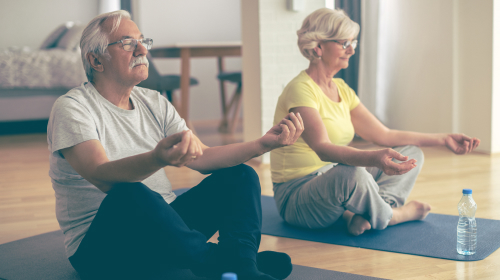Whispers of Time: Secrets of Longevity from the Elders of the Earth
Longevity is an enigma wrapped in simple moments, a tale told not by fleeting fame but by lives that stretch like old rivers, winding, flowing, and patiently wearing down the rocks of time. For those who have crossed the threshold of ninety, or even a hundred years, each wrinkle is a chapter, each laugh line a memory that holds a secret to life’s quiet endurance. Here, our HHA through the veil and gather these whispered secrets of longevity, as shared by those who wear the weight of years with grace.
1. The tips from centenarians: A Dance with Nature
Centenarians have often lived in tune with nature’s rhythm, a quiet alignment that respects the seasons, the light, and the dark. Many elders recount the value of deep breaths, early mornings, and evening quietude. This natural rhythm is not just a lifestyle; it’s a mindset. Rising with the sun, breathing deeply in fresh air, and honoring sleep as a sacred ritual sustains vitality in body and soul.
Tip: Embrace the sun’s rhythms. Spend time outside in the morning, allowing natural light to gently wake the senses, and cultivate evening routines that calm the mind before sleep.
2. How to live long and healthy?
Among those who have lived the longest, food is seen as fuel but also as joy. Many centenarians eat less, a habit sometimes born of necessity but often of wisdom. In Okinawa, Japan, elders practice “Hara Hachi Bu,” eating until they’re 80% full, allowing the body to digest easily, like a well-tuned engine. Fresh, whole foods – vegetables, fruits, and lean proteins – nourish their bodies without strain, while moderation becomes a trusted friend.
Tip: Honor meals by eating slowly, savoring each bite, and listening to the body’s signals. Choose foods from nature’s own shelves – fruits, vegetables, grains, and legumes – and keep meals light and vibrant.

3. Longevity tips for seniors: Movement as a Ritual of Gratitude
Longevity doesn’t always reside in grand exercise routines but in movement that becomes ritual. Whether it’s tending to a garden, walking through the neighborhood, or practicing Tai Chi, the elderly who live longest often keep their bodies in gentle motion. To them, movement is less about exercise and more about honoring the body, giving thanks through simple acts of activity.
Tip: Create daily rituals of movement. Try stretching in the morning, taking an evening stroll, or embracing light activities like gardening or dance. Gentle movement is the body’s daily refresh button, keeping it agile and balanced.
4. Healthy aging secrets: Connection and Companionship
Many centenarians attribute their long lives to the company they keep. In Sardinia, Italy, and Ikaria, Greece, elders live among loved ones and close friends, finding joy in conversation, laughter, and shared meals. Connection, it seems, is food for the heart, creating a purpose for rising each morning. Longevity thrives in these places where bonds are strong, and laughter is the soundtrack of the years.
Tip: Cultivate meaningful relationships. Keep friends and family close, make time for community, and nurture social rituals like family dinners, neighborhood gatherings, or shared hobbies.
5. The Power of Purpose: A Reason for Every Morning
Longevity blooms where purpose is planted. Elders who live long often wake with a sense of purpose, whether in a beloved hobby, tending to grandchildren, or caring for pets. For many, age is not an ending but a new beginning, a chance to contribute to the family, to share wisdom, or to nurture something alive. In these small duties, they find a reason to keep going, and in doing so, they keep their spirit young.
Tip: Identify a personal purpose, something that brings joy and meaning, whether it’s teaching a craft, nurturing a garden, or mentoring younger generations. Purpose is a bridge that connects the years and carries us forward.
6. Long life strategies for elderly: Laughter as Medicine, Humor as Companion
The elderly often possess a quiet humor, a lighthearted acceptance of life’s ups and downs. Many have witnessed loss, hardship, and change, yet they greet each day with a chuckle and an open heart. Laughter, for them, is medicine – it softens the aches, calms the mind, and turns even serious moments into celebrations of life’s unpredictability. For centenarians, humor is a shield against time’s weight, a reminder to take life seriously but never too seriously.
Tip: Invite laughter into everyday life. Seek joy in small things, let humor relieve life’s stress, and find lightness in each day. Laughing is a balm for the heart, a simple practice that keeps the spirit resilient.
7. Mindfulness in All Things: Presentness as a State of Being
Long life often brings wisdom, and for many elders, mindfulness is a gift they have naturally embraced. They live deeply in each moment, savoring every taste, every conversation, and every view of a sunset. Instead of rushing, they listen to life’s pace, walking in step with time rather than chasing it. Mindfulness becomes their fountain of youth, slowing down the years by paying attention to each moment.
Tip: Practice mindfulness by savoring daily experiences – the feel of water on the skin, the taste of food, the rhythm of breath. Being fully present helps each moment expand, making life richer and more enduring.
8. Senior wellness practices: Acceptance and Flexibility
Centenarians have lived through decades of change, adapting to new realities and embracing the unknown. This flexibility – a willingness to accept life’s twists with open arms – is their quiet superpower. Many talk of letting go of grudges, embracing forgiveness, and finding peace in what cannot be controlled. This ability to bend like a reed rather than break creates a life filled with ease and grace.
Tip: Cultivate flexibility of mind and heart. Embrace change, let go of resentments, and seek peace in the present. This adaptability is a wellspring of resilience, allowing the years to flow by without taking away life’s joy.
9. Wisdom and Simplicity
The wisdom of age often brings a love for simplicity. Many centenarians speak of decluttering their lives, not just physically but emotionally. They focus on what truly matters – love, health, and laughter. Life, they say, becomes lighter when stripped down to essentials, and this lightness is the secret to longevity. The mind and body, freed from excess, thrive on this pared-down simplicity.
Tip: Simplify where you can. Let go of material excess and focus on what brings joy and contentment. A simple life is a peaceful life, one that preserves the spirit’s energy for what truly matters.
In Closing: The Legacy of Time’s Elders
The secrets of longevity are not hidden in elixirs or arcane wisdom; they are woven into the everyday actions and gentle habits of those who have lived them. For the elderly who have defied time, longevity is an art – not a grand masterpiece but a mosaic of simple, humble practices that honor life’s quiet beauty.
Each day is a brushstroke in the painting of a life well-lived, every habit a stitch in the tapestry of endurance. Their whispers tell us that a long life is not a race or a battle but a journey, walked with calm steps, deep breaths, warm hearts, and a soul attuned to the rhythm of being. In these quiet steps lie the secrets that let us not merely age, but age gracefully, with purpose, peace, and a heart that continues to smile at life’s infinite wonder.
At Angel Care Inc., every moment with your loved one is like adding a gentle brushstroke to the canvas of their golden years, a small act of devotion in the masterpiece of a life richly lived. Here, care is not rushed or routine; it is a rhythm, a quiet harmony of kindness and respect, honoring each day as it unfolds. Our caregivers walk beside them with warm hearts and steady hands, attuned to the pace of their journey. In our presence, they find not only assistance but companionship that cherishes the beauty of their life’s story, one smile, one memory, and one graceful step at a time.

Memory in old age is a curious thing, like a grand library where the tomes of life’s moments sit on dust-free shelves, each one waiting to be opened, each one telling its tale. But as the years unfurl, some pages become harder to read, some chapters dim. It’s not that the library grows smaller; rather, it’s as if a gentle fog has settled. For seniors, preserving the vividness of this inner tapestry – the agility of thought, the clarity of memory – is both an art and a science. Here, our caregivers explore ways to brighten these cherished memories and keep the mind nimble and curious, a vibrant garden that blossoms across time. 1. The Dance of Daily Rituals for save improving memory for the elderly In the golden years, routine can be a trusted friend, a soft anchor that brings stability. Seniors benefit from maintaining daily rituals that reinforce memory. Small habits – setting keys in the same spot, keeping a daily journal, or creating a consistent morning routine – cue the mind to recall, sharpening the patterns that protect against forgetfulness. These rituals become gentle reminders, woven seamlessly into each day. Tip: Encourage seniors to create visual cues, like labels on drawers or checklists, which support routine and give memory a steady rhythm. 2. Memory maintenance tips for the elderly: Exercising Language and Vocabulary Language is a tapestry of sounds and meanings, and in the senior mind, it is a treasure trove of wisdom. Reading, storytelling, and word games like crosswords or Scrabble stimulate memory and improve cognitive functions. These exercises keep the language centers of the brain active, fostering mental agility and lending seniors the joy of rediscovering the richness of language. Tip: Seniors can keep a “word garden” journal, adding a new word each day, writing its meaning, and using it in sentences to plant it firmly in memory. 3. The Symphony of Movement: Physical Exercise for the Mind Movement has a marvelous way of supporting the mind. Gentle exercises like walking, stretching, and even dance enhance circulation and release endorphins, creating a harmonious flow that refreshes the brain. Physical activity has been shown to improve memory and reduce the risk of cognitive decline, with the added benefit of reducing stress and promoting better sleep. Tip: Seniors can explore activities like Tai Chi or simple stretching routines, which combine physical motion with mental calm, creating a symphony that benefits the whole being. 4. Nourishing the Mind’s Garden: Diet and Brain Health Food can be medicine, especially when it comes to supporting memory and cognitive function. Antioxidant-rich fruits, omega-3-rich fish, leafy greens, and nuts like walnuts serve as nutrients for the brain, protecting against age-related cognitive decline. For seniors, enjoying these foods becomes a small ritual of self-care, each bite nurturing the memory centers and enhancing mental clarity. Tip: A “memory diet” – rich in blueberries, salmon, leafy greens, and a splash of olive oil – creates a daily dose of brain-boosting power, keeping the mind well-nourished. 5. The Theater of the Mind: Brain Games and Cognitive Exercises for Elderly Mental agility is like a stage where memory, creativity, and logic perform in harmony. Cognitive exercises, including puzzles, memory games, and logic problems, keep the brain engaged and resilient. Websites and apps offer an array of brain games tailored for seniors, each one a playful exercise in focus, recall, and critical thinking. Tip: Encourage seniors to set aside 15 minutes daily for brain games. Sudoku, online puzzles, and memory-matching games offer a stimulating way to enhance cognitive functions while having fun. 6. Brain health for seniors: Meditation and Cognitive Clarity Meditation offers the brain a quiet moment to breathe, a space for memory to settle and for thoughts to align. Mindfulness meditation practices – focusing on the breath, observing thoughts without judgment – have been shown to reduce stress, improve focus, and even increase gray matter in the brain. For seniors, it becomes a soothing ritual, like clearing the fog from a morning window to reveal clarity and calm. Tip: Seniors can begin with five-minute guided meditations, focusing on simple breathing exercises that create a calm foundation for mental agility. 7. Social Storytelling and Conversations preventing cognitive decline in elderly Social interaction is a nourishing fountain for cognitive function. Whether over a cup of tea with a friend or a weekly call with a family member, conversations ignite memories and encourage mental engagement. Seniors can swap stories, recall past adventures, or even share favorite recipes, each conversation strengthening recall and enriching the mind’s tapestry. Tip: Encourage seniors to participate in community groups or book clubs, where discussions not only exercise memory but also offer a sense of connection and belonging. 8. Engaging in Meaningful Activities for mental agility in old age Purpose is like sunlight for the soul, and seniors who find meaningful activities experience a boost in cognitive health. Whether through volunteer work, gardening, or painting, having a purposeful pursuit enriches memory and nurtures mental agility. This purpose doesn’t have to be grand; it can be as simple as tending a small garden or knitting blankets for loved ones. Each act is a reminder that one’s contributions remain valuable. Tip: Seniors can explore hobbies that blend creativity and purpose, such as joining a community art class, volunteering locally, or starting a family history project. 9. Lifelong Learning: Keeping Curiosity Alive Learning something new brings the thrill of discovery, keeping memory sharp and the mind receptive. Seniors can embark on virtual tours of museums, take online classes, or join a language group. The act of learning revitalizes neural connections, enhancing memory and encouraging mental resilience. New experiences, even in small doses, prevent cognitive decline, keeping the mind bright and open. Tip: Encourage seniors to try online platforms like Coursera or MasterClass, where they can learn from experts and engage in topics that spark their interest. In Closing: The Ever-Flowing Fountain of Memory Memory in the golden years is a gift that unfolds softly, a treasure to be cherished and tended. Each tip, each gentle exercise, is a drop in the fountain of mental agility, a ritual that preserves the vividness of life’s moments. For the elderly, cognitive health is more than preserving memory; it’s about keeping the mind curious, open, and engaged, like a well-tended garden that continues to bloom. With these practices, the tapestry of memory is not merely preserved – it flourishes, inviting seniors to enjoy the richness of each thought, each moment, each cherished recollection. And in this garden of the mind, age is not a barrier but a testament to the power and beauty of a life deeply lived, woven in memories that shine as brightly as the morning sun. At Angel Care Inc., we believe care is more than assistance; it is a nurturing touch that honors each memory, every laugh, and all the tender moments that make a life whole. In New York, our mission is to help your loved one live with dignity and joy, filling each day with the comfort of familiar faces and the warmth of attentive hands. Our caregivers are not just helpers—they are companions on this journey, tending to the delicate threads of each story, preserving the beauty and grace of a life lived fully. Here, care is a legacy, a quiet promise to cherish and protect what matters most.

In the ever-evolving tapestry of caregiving, communication stands as the golden thread that unites caregivers and seniors. The art of communication in elderly care is both a necessity and a cherished skill, unlocking pathways to understanding, compassion, and trust. As technology becomes more intuitive, a myriad of communication tools for seniors has emerged, empowering connections that transcend the challenges of aging. The Role of Communication in Elderly Care Communication is more than the exchange of words; it is the conduit for emotional well-being, fostering a sense of belonging and purpose. For caregivers, mastering the art of communication with seniors requires patience, empathy, and the right tools. By embracing technology for senior communication, caregivers can enhance the quality of life for those they serve, ensuring that no voice goes unheard. Senior-Friendly Phones and Devices: Simplicity Meets Innovation At the heart of modern communication lie senior-friendly phones and devices, thoughtfully designed with simplicity in mind. Devices such as the Jitterbug Smart3 and GrandPad blend large, easy-to-read screens with user-friendly interfaces, making them some of the best communication devices for elderly individuals. These tools prioritize accessibility, allowing seniors to stay connected with loved ones without the frustration of complex technology. Features to Look For: Large, high-contrast buttons Voice-activated commands Emergency call options Built-in health monitoring features Such innovations not only foster independence but also empower seniors to remain an active part of their families and communities. Communication Aids Beyond Phones: Expanding the Horizon Technology has expanded the realm of senior communication far beyond traditional telephony. Devices like video communication platforms (Zoom, Skype, or FaceTime) enable face-to-face interactions, bringing distant loved ones closer. Additionally, wearable devices with voice communication, such as smartwatches, add convenience and functionality to daily interactions. For seniors with hearing or speech difficulties, assistive devices such as amplified phones or speech-to-text technology provide a lifeline to seamless communication. These easy-to-use communication tools for elderly individuals underscore the power of innovation in bridging communication gaps. Enhancing Communication in Elderly Care: Tips for Caregivers While technology plays a pivotal role, caregivers must also cultivate interpersonal skills to foster meaningful connections. Here are some caregiver communication tips for seniors that can transform everyday interactions: Practice Active Listening: Focus on understanding their needs and emotions without rushing to respond. Adapt Your Approach: Adjust your tone, volume, and choice of words to match the senior’s comfort level. Utilize Visual Aids: Incorporate pictures, gestures, or written notes for clarity, especially for seniors with memory challenges. Encourage Engagement: Use conversation starters that tap into their interests, hobbies, or cherished memories. When combined with senior-friendly tools, these techniques create an environment of trust and understanding. Improving Elderly Communication Skills Through Technology Caregivers can help seniors navigate the digital world, building confidence and improving elderly communication skills. Introducing apps with intuitive designs, like WhatsApp or Marco Polo, can revolutionize how seniors interact with family members and friends. By guiding them patiently and celebrating small victories, caregivers empower seniors to embrace new technologies with enthusiasm. The Promise of Connection: Bridging the Gap In a world increasingly defined by technology, the quest to enhance communication in elderly care is more attainable than ever. By leveraging the best communication tools for seniors and coupling them with caregiver communication strategies, the bond between generations becomes unbreakable. Through thoughtful innovations and compassionate care, we unlock the potential to not only improve communication but also to enrich lives, one meaningful conversation at a time. In this journey, every word shared becomes a bridge to understanding, a beacon of hope, and a testament to the enduring power of connection. If you or your loved one requires assistance at home, contact the Angel Care Inc. team today and begin your journey with us.



